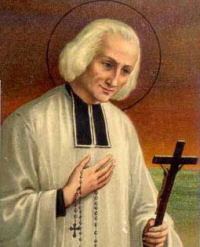Ordinary Time: August 4th
Memorial of St. John Vianney, priest
 SECOND READING
SECOND READINGFrom the Catechetical Instructions by Saint John Mary Vianney, priest
(Catechisme sur la prière: A. Monnin, Esprit du Curé d’Ars, Parish 1899, pp. 87-89)
The glorious duty of man: to pray and to love
My little children, reflect on these words: the Christian’s treasure is not on earth but in heaven. Our thoughts, then ought to be directed to where our treasure is. This is the glorious duty of man: to pray and to love. If you pray and love, that is where a man’s happiness lies.
Prayer is nothing else but union with God. When one has a heart that is pure and united with God, he is given a kind of serenity and sweetness that makes him ecstatic, a light that surrounds him with marvelous brightness. In this intimate union, God and the soul are fused together like two bits of wax that no one can ever pull apart. This union of God with a tiny creature is a lovely thing. It is a happiness beyond understanding.
We had become unworthy to pray, but God in his goodness allowed us to speak with him. Our prayer is incense that gives him the greatest pleasure.
My little children, your hearts are small, but prayer stretches them and makes them capable of loving God. Through prayer we receive a foretaste of heaven and something of paradise comes down upon us. Prayer never leaves us without sweetness. It is honey that flows into the soul and makes all things sweet. When we pray properly, sorrows disappear like snow before the sun.
Prayer also makes time pass very quickly and with such great delight that one does not notice its length. Listen: Once when I was a purveyor in Bresse and most of my companions were ill, I had to make a long journey. I prayed to the good God, and believe me, the time did not seem long.
Some men immerse themselves as deeply in prayer as fish in water, because they give themselves totally to God. There is not division in their hearts. O, how I love these noble souls! Saint Francis of Assisi and Saint Colette used to see our Lord and talk to him just as we talk to one another.
How unlike them we are! How often we come to church with no idea of what to do or what to ask for. And yet, whenever we go to any human being, we know well enough why we go. And still worse, there are some who seem to speak to the good God like this: “I will only say a couple of things to you, and then I will be rid of you.” I often think that when we come to adore the Lord, we would receive everything we ask for, if we would ask with living faith and with a pure heart.
ww.ibreviary.com/m/breviario.php?s=ufficio_delle_letture


